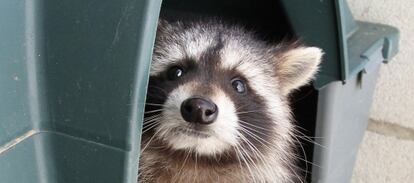Raccoon roundup in Madrid region turns ruthless
The invasive species is proliferating in the Regional Park that runs alongside the Tagus valley

Just previous to Christmas 1995, Miko, a cute little Disney raccoon, enchanted many Madrid children in the film Pocahontas. Many parents solved the Christmas gift problem by going out and buying a cute little furry kit raccoon (the young are known as kits).
But raccoons live in packs, and as the kit reaches sexual maturity and finds himself in a cage deprived of social company, he is a liable to turn vicious and start biting the hand that feeds him. Then, for most caprice buyers, it is time to take the little fellow for a ride and turn him loose in the woods. Goodbye, good luck, and hope you catch some fish and bugs.
Since then the raccoons have prospered all too well. Miko's relatives have now become a threat to the autochthonous fauna of the Madrid region. Since 2007, the regional government has captured 407 specimens of the North American mammal.
It does not say how many it has killed. "The priority is to donate them to zoos. Raccoons that are ill or have been hit by cars are put to sleep," explains a spokeswoman.
Miko the raccoon in the film Pocahontas "has done a lot of harm"
Some reside in the regional government's Wild Animal Recovery Center (CRAS) at Soto de Viñuelas, with capacity for 3,000 animals.
One of Miko's cute quirks is that of washing his food, and it is for this curious habit (variously explained) that the species, native to North America, is best known. Procyon lotor, its Linnaean name, means roughly "dog-like washer." In German it is called Waschbär (wash-bear), in French raton laveur (washer rat). The English and Spanish names, raccoon and mapache, come from Native American languages in Virginia and Mexico respectively.
What was initially seen as a "potential danger," with 15 individuals caught in 2007, has burgeoned into a serious problem for the ecosystem, with captures rising steadily since then.
"Raccoons live five years on average, so the animals we are now catching are descendants of the ones that were released here when they matured, or else they escaped," says the head of the regional environment department, Borja Sarasola, who notes their particular skill at getting out of cages.
Madrid is not alone in its problem with these intelligent and adaptable little carnivores. Escaped pets have proliferated around several cities in Europe and Japan. In Russia the raccoon was once methodically introduced with a view to hunting it for fur, and is now common from the Caucasus to Moscow.
Of the more than 400 raccoons that have been captured in the region, 242 came from the Southeast Regional Park, which runs along the wooded land beside the River Tagus.
Since 1995 this park has become Raccoon City, the base of the region's feral raccoon population. "They have been thriving there, in a habitat they find congenial - a wooded, aquatic ecosystem," says Sarasola, who notes how raccoons form packs of 15 to 20 individuals, and drive out native species, particularly the otter. They are aggressive, and their bite potentially transmits rabies and other diseases. "Pocahontas has done a lot of harm," Sarasola says.
"We are looking at a public health problem and a danger to native species, about which nothing has been done in almost 20 years, and now suddenly they're all in a hurry. There is no strategy for solving this situation. What began as a joke has turned into a real threat," says Gabriel López, a regional deputy for the opposition centrist UPyD party.
"There is now a planned program that began in 2007 in the Southeast Regional Park, for control of the species by selective trapping of feral animals," a government spokesman says. However, the administration admits to not knowing how many raccoons are in the region.
A broader, region-wide plan was adopted in 2012, with a more ambitious objective, mentioning the "possible eradication" of the raccoon.
The regional government now holds meetings on this issue with the Ministry of Agriculture, Food and the Environment, and with neighboring regions.
The ministry contributes "two single-person specialist patrols," each with a vehicle and equipment for capturing and handling raccoons.
The forest wardens of the Tagus Valley Water Confederation, the agriculture agency Imidra, and the regional environment department do the actual trapping and hunting.
The propagation of this invasive species, and of others such as the Argentine parrot and Kramer's parrot - openly sold as pets until December 2011 - has resulted in a new regional "capture and kill" policy, featuring "extreme measures" valid "in the course of any authorized hunting activity, including those applicable in the normal hunting season," according to a directive issued by the regional administration.
The job of eradication, however, is a monopoly of authorized personnel - of the municipal and regional governments and their contractors, or at least it must be conducted in cooperation with them. And not just anything goes. Poison and other "unselective" methods that affect the rest of the flora and fauna are banned. The use of firearms requires a permit.
The regional government is now also running "capture campaigns" against the Florida turtle, which has been banned from sale in pet shops, the American mink, and other invasive species.
Tu suscripción se está usando en otro dispositivo
¿Quieres añadir otro usuario a tu suscripción?
Si continúas leyendo en este dispositivo, no se podrá leer en el otro.
FlechaTu suscripción se está usando en otro dispositivo y solo puedes acceder a EL PAÍS desde un dispositivo a la vez.
Si quieres compartir tu cuenta, cambia tu suscripción a la modalidad Premium, así podrás añadir otro usuario. Cada uno accederá con su propia cuenta de email, lo que os permitirá personalizar vuestra experiencia en EL PAÍS.
¿Tienes una suscripción de empresa? Accede aquí para contratar más cuentas.
En el caso de no saber quién está usando tu cuenta, te recomendamos cambiar tu contraseña aquí.
Si decides continuar compartiendo tu cuenta, este mensaje se mostrará en tu dispositivo y en el de la otra persona que está usando tu cuenta de forma indefinida, afectando a tu experiencia de lectura. Puedes consultar aquí los términos y condiciones de la suscripción digital.









































